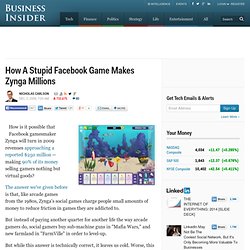

Google Lets You Blow Up A Picasso With New Art Project - Parmy Olson - Disruptors. How Facebook Killed (Most) Spam Using Smart Filters. Do you "like" receiving Facebook messages about, say, your buddy Rich's new row of corn in FarmVille?

If not, you're in luck: Facebook CTO Bret Taylor told Fast Company earlier this week that it's just those kind of messages the company focused on while looking to cut down on spam in the system--way down. Mission accomplished. Such spam was down 95% in 2010. That’s an impressive achievement. But the backstory to how the company accomplished that feat reveals some of the internal thinking that could be key to Facebook’s ability to continue to grow efficiently--and become an all-around ever-stronger product--in the years to come.
The spam Facebook was targeting were those annoying messages from the likes of FarmVille or Mafia Wars (about Rich and his corn or whatnot) that used to pollute users’ NewsFeeds. “Our focus coming into 2010 was really around user experience,” Taylor said. It was also a bad experience for both Facebook itself and for application developers. Facebook Will Be Using Your Face in ‘Sponsored Stories’ Ads (And There’s No Opting Out) - Kashmir Hill - The Not-So Private Parts. AdFreak: Soon, your life will be nothing but Facebook. Facebook kan lokke de unge på museum. Hvis danske museer har en ambition om at fange unges opmærksomhed, skal de bruge flere kræfter og være langt mere synlige på sociale netværk som især Facebook. I dag kommunikerer museerne ofte på trykte medier som plakater, der hænges op på uddannelsessteder.
Men de unge bruger de digitale medier. Museerne skal ikke bare være på Facebook, de skal også indbyde de unge til dialog og debat, der kan inspirere dem til at gå på museum. Samtidig skal museerne satse mere på særlige events for eksempel om aftenen, der kan tiltrække de unge. Det efterspørger de unge i en undersøgelse, som Johanne Floris Christensen har lavet i forbindelse med sit speciale på Syddansk Universitet om de 20-29-åriges brug af museerne.
Nedslående læsning »De unge har interessen, men de bliver oversvømmet af kulturtilbud, og de orienterer sig typisk i dem på Facebook, på IBYEN eller AOK. »Museerne er public service-institutioner for hele den danske befolkning. LÆS OGSÅDe danske museer er en lukket fest. Please Touch! Interactive Museums - Arts & Events. “Look, but don’t touch” has been the watchword for museums.

The only exceptions were institutions designed for children that offered lots of bells and whistles to keep the kids entertained. The rest of us trooped past static exhibits and often emerged with glazed eyes, believing we had to take our cultural medicine the way our parents did. Not anymore. Museums recognize that one boring experience can turn off a visitor for life, says Patrick Gallagher, who has designed museums and exhibits ranging from the International Spy Museum in DC to the D-Day Museum in Normandy that opened on June 6.
Museums have embraced technology to create multimedia exhibits that make the visitor a participant rather than an observer. One way to do that is to make the visitor part of the story. Another approach is to use technology to let visitors tailor the experience to their own interests. Always dreamed of being a Top Gun? The International Spy Museum was designed to be a total “see it, be it” experience. The Rise Of The Corporate Transmedia Storyteller - Forbes.com. How Facebook Games Make Money. How is it possible that Facebook gamesmaker Zynga will turn in 2009 revenues approaching a reported $250 million -- making 90% of its money selling gamers nothing but virtual goods?

The answer we've given before is that, like arcade games from the 1980s, Zynga's social games charge people small amounts of money to reduce friction in games they are addicted to. But instead of paying another quarter for another life the way arcade gamers do, social gamers buy sub-machine guns in "Mafia Wars," and new farmland in "FarmVille" in order to level-up. But while this answer is technically correct, it leaves us cold. Worse, this answer doesn't make much sense if you've never actually seen a Facebook game. It leaves us asking: Really? So, in order to figure out how these social games actually work -- and make money -- we decided to suck it up and get addicted to one. We picked FishVille, the latest hit from Zynga.
We'd explain more, but it's really just easier to show you how it works.